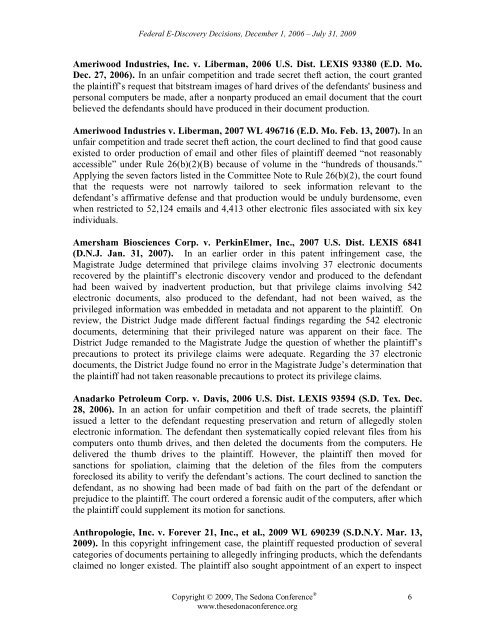Federal Court Decisions Involving Electronic Discovery, December 1 ...
Federal Court Decisions Involving Electronic Discovery, December 1 ...
Federal Court Decisions Involving Electronic Discovery, December 1 ...
Create successful ePaper yourself
Turn your PDF publications into a flip-book with our unique Google optimized e-Paper software.
<strong>Federal</strong> E-<strong>Discovery</strong> <strong>Decisions</strong>, <strong>December</strong> 1, 2006 – July 31, 2009<br />
Ameriwood Industries, Inc. v. Liberman, 2006 U.S. Dist. LEXIS 93380 (E.D. Mo.<br />
Dec. 27, 2006). In an unfair competition and trade secret theft action, the court granted<br />
the plaintiff’s request that bitstream images of hard drives of the defendants' business and<br />
personal computers be made, after a nonparty produced an email document that the court<br />
believed the defendants should have produced in their document production.<br />
Ameriwood Industries v. Liberman, 2007 WL 496716 (E.D. Mo. Feb. 13, 2007). In an<br />
unfair competition and trade secret theft action, the court declined to find that good cause<br />
existed to order production of email and other files of plaintiff deemed “not reasonably<br />
accessible” under Rule 26(b)(2)(B) because of volume in the “hundreds of thousands.”<br />
Applying the seven factors listed in the Committee Note to Rule 26(b)(2), the court found<br />
that the requests were not narrowly tailored to seek information relevant to the<br />
defendant’s affirmative defense and that production would be unduly burdensome, even<br />
when restricted to 52,124 emails and 4,413 other electronic files associated with six key<br />
individuals.<br />
Amersham Biosciences Corp. v. PerkinElmer, Inc., 2007 U.S. Dist. LEXIS 6841<br />
(D.N.J. Jan. 31, 2007). In an earlier order in this patent infringement case, the<br />
Magistrate Judge determined that privilege claims involving 37 electronic documents<br />
recovered by the plaintiff’s electronic discovery vendor and produced to the defendant<br />
had been waived by inadvertent production, but that privilege claims involving 542<br />
electronic documents, also produced to the defendant, had not been waived, as the<br />
privileged information was embedded in metadata and not apparent to the plaintiff. On<br />
review, the District Judge made different factual findings regarding the 542 electronic<br />
documents, determining that their privileged nature was apparent on their face. The<br />
District Judge remanded to the Magistrate Judge the question of whether the plaintiff’s<br />
precautions to protect its privilege claims were adequate. Regarding the 37 electronic<br />
documents, the District Judge found no error in the Magistrate Judge’s determination that<br />
the plaintiff had not taken reasonable precautions to protect its privilege claims.<br />
Anadarko Petroleum Corp. v. Davis, 2006 U.S. Dist. LEXIS 93594 (S.D. Tex. Dec.<br />
28, 2006). In an action for unfair competition and theft of trade secrets, the plaintiff<br />
issued a letter to the defendant requesting preservation and return of allegedly stolen<br />
electronic information. The defendant then systematically copied relevant files from his<br />
computers onto thumb drives, and then deleted the documents from the computers. He<br />
delivered the thumb drives to the plaintiff. However, the plaintiff then moved for<br />
sanctions for spoliation, claiming that the deletion of the files from the computers<br />
foreclosed its ability to verify the defendant’s actions. The court declined to sanction the<br />
defendant, as no showing had been made of bad faith on the part of the defendant or<br />
prejudice to the plaintiff. The court ordered a forensic audit of the computers, after which<br />
the plaintiff could supplement its motion for sanctions.<br />
Anthropologie, Inc. v. Forever 21, Inc., et al., 2009 WL 690239 (S.D.N.Y. Mar. 13,<br />
2009). In this copyright infringement case, the plaintiff requested production of several<br />
categories of documents pertaining to allegedly infringing products, which the defendants<br />
claimed no longer existed. The plaintiff also sought appointment of an expert to inspect<br />
Copyright © 2009, The Sedona Conference ® 6<br />
www.thesedonaconference.org
















